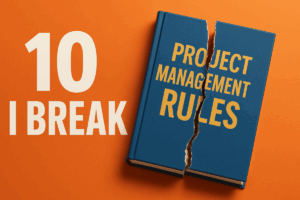Preparing for Your Next Job Interview: Mastering the AI Interview Process
Job interviews are a crucial step in the hiring process. They give job seekers the opportunity to showcase their skills and qualifications to potential employers. With the advancements in technology, artificial intelligence (AI) has become increasingly prevalent in the interview process. In this article, we will explore how companies use AI in interviews, the differences between AI and human-driven interviews, and how job seekers can prepare to succeed in the AI interview process.
What Value You Will Get From Reading This Article?
By reading this article, job seekers will gain a comprehensive understanding of how AI is utilized in the interview process and learn valuable tips and techniques to prepare for AI-driven interviews. They will also discover the benefits of AI-powered interviews and how to optimize their chances of success in the AI interview process.
How AI is Used in the Interview Process?
What is AI Used For in an Interview?
AI is used in interviews for various purposes. One of the primary uses of AI in the interview process is to automate certain tasks that were traditionally performed by humans. For example, AI algorithms can be used to assess job candidates based on their resumes and provide recommendations to hiring managers. This enables recruiters to save time and resources in the initial screening phase of the recruitment process.
How Do AI Interviews Work?
AI interviews work by leveraging artificial intelligence technology to evaluate job candidates. AI-powered interview platforms use algorithms to analyze candidates’ responses to interview questions. The algorithms assess various factors, such as the quality of the response, the use of keywords, and even facial expressions, to determine the candidate’s fit for the role. This allows hiring managers to make more informed decisions and identify the most qualified candidates.
What are the Biggest Differences between an AI and a Human Driven Interview?
While both AI and human-driven interviews serve the same purpose of assessing a candidate’s suitability for a role, there are several notable differences between the two. One significant difference is that AI interviews by a bot rely on AI data-driven technology to assess candidates, whereas human-driven interviews rely on human intuition and judgment. Additionally, AI interviews can be conducted remotely using automated video interviews. While human-driven interviews can be remote as well, they are traditionally conducted in person. This is something that an AI cannot do.
Benefits of AI-Powered Interviews
AI-powered interviews offer several benefits to both job seekers and employers. For job seekers, AI interviews provide a fair and unbiased assessment based on a standardized set of criteria. This eliminates any potential biases that may arise in human-driven interviews. Additionally, AI interviews can save job seekers time and effort, as they can be conducted remotely without the need for travel.
For employers, AI-powered interviews streamline the recruitment process by automating certain tasks, such as resume screening and candidate assessment. This allows hiring managers to focus their time and energy on interviewing the most promising candidates. AI interviews also help to minimize human bias in the hiring process, promoting diversity and inclusion in the workplace.
What Part Do Humans Play in an AI Interview?
While AI plays a significant role in the interview process, humans still have an essential part to play. AI technology can automate certain tasks, but human judgment and intuition are crucial in making final hiring decisions. Human recruiters and hiring managers are responsible for interpreting the results of AI assessments and conducting follow-up interviews to further evaluate candidates.
Preparing for an AI Job Interview
Research the Company’s Use of AI
Before attending an AI job interview, it is crucial to research the company’s use of AI. This includes understanding how they incorporate AI into their recruitment process and the specific AI tools or algorithms they utilize. By gaining this knowledge, job seekers can tailor their responses during the interview to align with the company’s values and priorities.
Understand the Recruitment Process
Job seekers should also have a thorough understanding of the AI-driven recruitment process. This includes knowing what to expect during each stage, from the initial resume screening to the final interview. By familiarizing themselves with the process, job seekers can better prepare and position themselves as strong candidates.
Mastering Conversational AI
Conversational AI is a crucial skill to master when preparing for an AI job interview. Job seekers should practice communicating with AI chatbots or virtual assistants to become comfortable with the conversational style. It is essential to understand how to articulate thoughts clearly and respond effectively to questions asked by AI algorithms.
What Steps Are Needed to Succeed in the AI Interview Process?
Polish Your Technical Skills
In the AI interview process, technical skills are highly valued. Job seekers should polish their technical knowledge and ensure they are up to date with the latest industry trends and developments. Being well-versed in programming languages, data analysis, and AI algorithms will significantly increase the chances of success in an AI job interview.
Sharpen Your Problem-Solving Abilities
Problem-solving is another essential skill that job seekers should focus on when preparing for an AI interview. AI-driven interviews often include scenarios or case studies that require candidates to demonstrate their problem-solving abilities. Practicing real-world problem-solving exercises and honing critical thinking skills will help job seekers excel in these interviews.
Do you answer an AI like answering a Human?
When answering AI-led interviews, job seekers should strive to strike a balance between conversational and professional tone, just like they would when answering human interviewers. While AI algorithms are designed to assess candidates based on specific criteria, it is crucial for job seekers to convey their qualifications and experience in a manner that is both engaging and informative.
Practice with AI-Led Interviews
One of the best ways to prepare for AI interviews is to practice with AI-led interview platforms. Many online resources provide opportunities for job seekers to engage in simulated AI interviews. These practice sessions allow candidates to familiarize themselves with the interview format and gain insights into the types of questions and assessment methods used in AI-driven interviews.
Mastering the Video Interview
Tips for a Successful
Video Interview
A video interview is another common format used in the AI interview process. It is important for job seekers to familiarize themselves with the necessary techniques to succeed in a video interview. This includes setting up a professional and well-lit environment, dressing appropriately, and maintaining eye contact with the camera.
Utilizing Artificial Intelligence in Video Interviews
Artificial intelligence can be utilized in video interviews to analyze candidates’ non-verbal cues, such as facial expressions and body language. AI software can detect and interpret these cues to provide insights into the candidate’s behavior and level of engagement. Job seekers should be aware of this and ensure they convey their enthusiasm and interest effectively through the screen.
Common Mistakes to Avoid in Video Interviews
When participating in a video interview, there are several common mistakes that job seekers should avoid. These include poor internet connection, distractions in the background, and lack of proper preparation. By addressing these potential pitfalls, job seekers can present themselves in the best possible light during a video interview.
Preparing for AI Recruiting
Understanding the Role of AI in Recruitment
Job seekers should understand the role of AI in the overall recruitment process. AI is not limited to just interviews but is used throughout the entire hiring process, from resume screening to candidate assessment. By comprehending the impact of AI in recruitment, job seekers can better prepare themselves for AI-driven recruiting methods.
How to Prepare for AI-Driven Recruitment Processes
Preparing for AI-driven recruitment processes involves a combination of technical skills and adaptability. Job seekers should stay updated with the latest AI tools and technologies being used in recruitment. Additionally, being open to learning and demonstrating flexibility when interacting with AI systems will enhance the chances of success.
Building a Strong Online Presence
In an AI-driven recruitment process, a strong online presence is essential. Job seekers should actively manage their professional profiles on platforms such as LinkedIn and ensure their information is accurate and up to date. Having a well-crafted online presence will increase visibility and attract potential employers in the AI recruiting space.
Navigating the Complexities of AI in Interviews: Insights from Amazon’s Experience

A Real-World Example of AI’s Impact on Recruitment
In our journey to understand AI’s role in modern job interviews, it’s enlightening to examine real-world applications and their outcomes. Amazon’s foray into AI-driven recruitment offers a compelling case study that sheds light on both the potential and the pitfalls of AI in this domain.
Amazon’s AI Recruiting Tool: An Ambitious Start with Complex Challenges Amazon embarked on an ambitious project to revolutionize its recruitment process by implementing an AI tool designed to automate the screening of job applications. This tool aimed to sift through résumés efficiently, identifying the most promising candidates for the company.
Key Learnings from Amazon’s Experience
- Transparency Matters: A significant challenge with Amazon’s AI tool was its opaque decision-making process. The lack of clarity on how the AI made its selections posed questions about its fairness and reliability.
- Addressing Bias is Crucial: The tool, unfortunately, exhibited biases, particularly against female candidates, reflecting the historical data it was trained on. This unintended bias highlighted the critical need for AI systems to be trained on diverse and balanced datasets.
- A Step Back for Reflection: Due to these issues, Amazon had to step back and reevaluate the use of this AI tool in its recruitment process. This decision underscores the importance of vigilance and ethical responsibility in deploying AI technologies.
What This Means for Your AI Interview Preparation This case study emphasizes the importance of:
- Understanding AI’s Limitations: Recognize that AI tools, while advanced, are not infallible and can reflect existing biases.
- Preparing for Transparency: As a candidate, be aware that AI processes might not always be transparent, but preparing thoroughly for both AI and human elements of the interview can enhance your chances.
- Adapting to Evolving Technologies: Stay informed about how companies use AI in recruitment and be adaptable in your approach to these evolving technologies.
Conclusion
As the use of AI in the interview process continues to grow, job seekers must adapt and prepare themselves accordingly. By understanding how AI is utilized in interviews, researching companies’ use of AI, and mastering conversational AI, job seekers can increase their chances of success in the AI interview process. Additionally, by polishing technical skills, sharpening problem-solving abilities, and practicing with AI-led interviews, job seekers can showcase their qualifications effectively. Finally, mastering the video interview format, understanding the role of AI in recruitment, and building a strong online presence will position job seekers for success in the increasingly AI-driven job market.
If you liked this article, remember to subscribe to MiamiCloud.com. Connect. Learn. Innovate.








